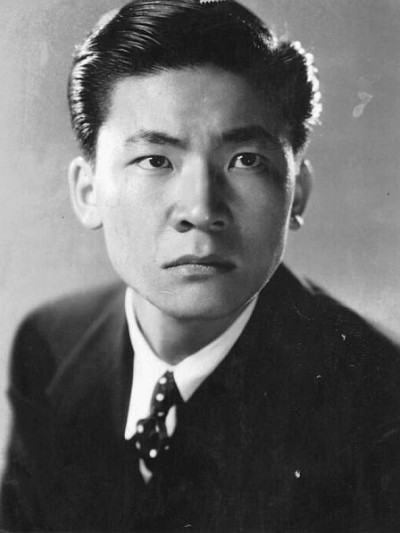Victor Sen Yung (Victor Sen Yung)

Sen Yung made his first significant acting debut in the 1938 film Charlie Chan in Honolulu, as the Chinese detective’s “number two son,” Jimmy Chan. In this movie, Sidney Toler replaced the recently deceased Warner Oland as Charlie Chan and Sen Yung replaced Oland’s “number one son” Lee, who had been played by Keye Luke. Sen Yung played Jimmy Chan in 11 Charlie Chan films between 1938 and 1942. He played a minor but crucial role of lawyer’s clerk Ong Chi Seng alongside Bette Davis in The Letter (1940). In common with other Chinese-American actors, Sen Yung was cast in Japanese parts during World War II, such as his role as the treacherous Japanese-American Joe Totsuiko in the 1942 Humphrey Bogart film Across the Pacific. During World War II Sen Yung joined the U.S. Army Air Forces. During his military service, he was replaced in the Charlie Chan series by Benson Fong, who played “number three son,” Tommy Chan. Yung’s military service included work in training films at the First Motion Picture Unit and a role in the Army Air Forces’ play and film Winged Victory.
After the war, Sen Yung resumed his Hollywood career. The Charlie Chan series was now in the hands of Monogram Pictures, with Sidney Toler continuing in the leading role. Toler’s health was failing by 1946; author Scott MacGillivray contends that Monogram was conserving Toler’s energy and shooting around him wherever possible, even reusing two-year-old footage to finish Toler’s last film. To relieve the burden on Toler, Monogram hired his original screen foil, Sen Yung (now billing himself as Victor Sen Young). He and Mantan Moreland shared the spotlight in Toler’s final two films, Shadows over Chinatown and The Trap. Following Toler’s death in 1947, Sen Yung made five additional Chan films with Roland Winters playing Charlie Chan. In his last appearance in the Chan series, Sen Yung appeared with “number one son” Lee Chan (Luke), their only appearance together. Curiously, in the Roland Winters films, Sen Yung played Tommy Chan, not Jimmy. Victor Sen Young continued to work in motion pictures but also moved into television, playing affable or earnest Asian characters. He is probably best remembered as Hop Sing, the cook on the long-running television series Bonanza, appearing in 102 episodes between 1959 and 1973. Sen Yung authored The Great Wok Cookbook in 1974.
In 1972, Yung was on Pacific Southwest Airlines Flight 710, which was hijacked. The FBI stormed the plane, and in the ensuing gunfire Sen Yung was shot in the small of the back. He and another wounded passenger survived, but a third passenger and the two hijackers were killed. In 1975, he appeared on Garry Moore’s To Tell The Truth show and related the events of the hijacking. With Yung dressed in a sport coat and flanked by two dissimilar imposters, none of the four panelists was able to choose him as the character actor. Victor Sen Yung died under unusual circumstances in his North Hollywood home in 1980. The actor, who ran a small mail-order Chinese pottery business, was creating clayware and curing the items with an oven, and died of natural gas poisoning from a gas leak. His body was found November 10, but he had reportedly been dead at least ten days. Some reports suggested at first that the actor had been murdered, but police ultimately ruled the death accidental. There is a memorial scholarship named after him, awarded each year by the Chinese Alumni Association of his alma mater, University of California, Berkeley, where he had majored in animal husbandry. The eulogy at his funeral was delivered by fellow Bonanza actor Pernell Roberts, who also paid the funeral expenses.
Born
- October, 18, 1915
- USA
- San Francisco, California
Died
- November, 01, 1980
- USA
- North Hollywood, California
Cause of Death
- natural gas poisoning
Cemetery
- Greenlawn Memorial Park
- Colma, California
- USA



